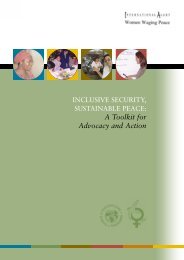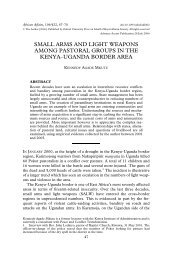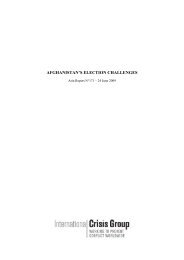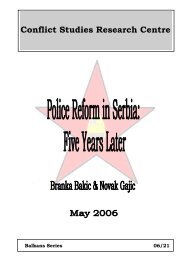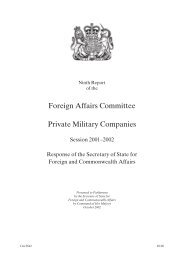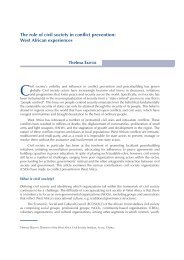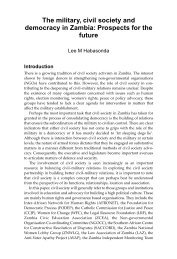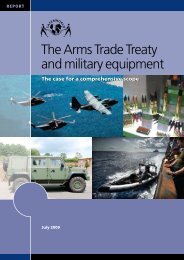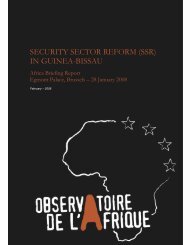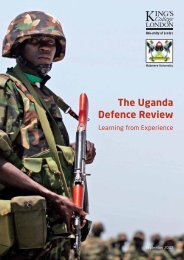promoting security sector reform in fragile states - GFN-SSR
promoting security sector reform in fragile states - GFN-SSR
promoting security sector reform in fragile states - GFN-SSR
Create successful ePaper yourself
Turn your PDF publications into a flip-book with our unique Google optimized e-Paper software.
tors. Development assistance agencies<br />
rout<strong>in</strong>ely support work aimed at<br />
strengthen<strong>in</strong>g public <strong>sector</strong> <strong>in</strong>stitutions,<br />
improv<strong>in</strong>g public <strong>sector</strong> governance,<br />
and develop<strong>in</strong>g human and social<br />
capital. Most frequently, assistance is<br />
provided for public expenditure analysis<br />
and management, <strong>in</strong>clud<strong>in</strong>g anticorruption<br />
activities and civil service and<br />
adm<strong>in</strong>istrative <strong>reform</strong>. Development<br />
assistance agencies also provide considerable<br />
support to democratization<br />
efforts, promotion of social justice and<br />
human rights, civil society capacity<br />
build<strong>in</strong>g, and legislative strengthen<strong>in</strong>g.<br />
All are relevant to the <strong>SSR</strong> agenda<br />
(box 4). Yet development assistance<br />
agencies have been slow to <strong>in</strong>corporate<br />
the <strong>security</strong> <strong>sector</strong> <strong>in</strong>to these areas.<br />
Development assistance agencies have<br />
not embraced the <strong>SSR</strong> agenda for the<br />
follow<strong>in</strong>g reasons:<br />
• a general desire to protect their “normal<br />
development work” from be<strong>in</strong>g<br />
derailed by engagement <strong>in</strong> politically<br />
sensitive topics<br />
• a concern that they do not have appropriate<br />
expertise to address <strong>security</strong>related<br />
work<br />
• a lack of clarity concern<strong>in</strong>g which activities<br />
are and are not ODA-eligible<br />
• legal restrictions on engag<strong>in</strong>g <strong>in</strong><br />
certa<strong>in</strong> types of activities or conservative<br />
<strong>in</strong>terpretations of rules by legal<br />
departments that m<strong>in</strong>imize risks<br />
Address<strong>in</strong>g issues of <strong>security</strong> <strong>sector</strong><br />
governance is clearly sensitive, but not<br />
<strong>in</strong>herently more so than <strong>promot<strong>in</strong>g</strong> anticorruption<br />
activities and other elements<br />
of governance. These k<strong>in</strong>ds of activities<br />
were rout<strong>in</strong>ely avoided by development<br />
assistance agencies until the 1990s,<br />
but they are now a staple of many aid<br />
agendas. Indeed, apply<strong>in</strong>g a governance<br />
perspective to <strong>security</strong>-related issues<br />
may help allay concerns of many local<br />
stakeholders. Additionally, by collaborat<strong>in</strong>g<br />
with donors <strong>in</strong> the <strong>security</strong> field,<br />
development assistance donors can<br />
ensure that a broad range of expertise<br />
on <strong>SSR</strong> issues is brought to the table <strong>in</strong><br />
discussions with partner governments.<br />
What Are Some of the Major<br />
Factors Shap<strong>in</strong>g a USAID<br />
Approach to <strong>SSR</strong>?<br />
In develop<strong>in</strong>g an approach to <strong>SSR</strong>,<br />
USAID may wish to consider 1)<br />
environments <strong>in</strong> which <strong>SSR</strong> programm<strong>in</strong>g<br />
will occur, 2) the Agency’s<br />
comparative advantage <strong>in</strong> design<strong>in</strong>g<br />
and deliver<strong>in</strong>g <strong>SSR</strong> assistance, and 3)<br />
the development of key partnerships.<br />
The Environment for <strong>SSR</strong><br />
Programm<strong>in</strong>g<br />
In formulat<strong>in</strong>g an <strong>SSR</strong> approach,<br />
USAID faces conditions that shape its<br />
ability to respond and the nature of its<br />
responses. One is the necessity of meet<strong>in</strong>g<br />
multiple purposes with the same<br />
fund<strong>in</strong>g. Another is the legal parameters<br />
def<strong>in</strong><strong>in</strong>g what can and cannot be funded<br />
under the Foreign Assistance Act of<br />
1961 (FAA). A third is the imbalance<br />
of power among different U.S. Government<br />
departments and agencies.<br />
1. The problems posed by assign<strong>in</strong>g “multiple<br />
and compet<strong>in</strong>g goals and objectives”<br />
to U.S. foreign assistance affect assistance<br />
for <strong>SSR</strong> as well as USAID assistance for all<br />
purposes.<br />
This constra<strong>in</strong>t is well known. It has<br />
been addressed at some length <strong>in</strong><br />
USAID’s White Paper on U.S. foreign<br />
assistance through the proposal to allocate<br />
and manage resources aga<strong>in</strong>st<br />
five core foreign aid goals (box 7).<br />
Ongo<strong>in</strong>g efforts by USAID and the<br />
Department of State to more closely<br />
align foreign policy and development<br />
objectives could help mitigate this<br />
problem. Ultimately, however, Congress<br />
has to be persuaded that multiple<br />
task<strong>in</strong>g is counterproductive.<br />
2. FAA provisions and <strong>in</strong>terpretations of<br />
them affect USAID’s ability to engage <strong>in</strong><br />
<strong>SSR</strong>.<br />
The FAA divides foreign assistance<br />
<strong>in</strong>to economic assistance and military<br />
assistance. USAID regulations prevent<br />
economic assistance from be<strong>in</strong>g used<br />
to f<strong>in</strong>ance goods or services “where the<br />
primary purpose is to meet military requirements<br />
of the cooperat<strong>in</strong>g country”<br />
(USAID 2004a, 312.4a). Exceptions to<br />
this rule are not allowed. To determ<strong>in</strong>e<br />
whether economic assistance is be<strong>in</strong>g<br />
diverted to military purposes, USAID<br />
Box 7. Five Core<br />
Operational Goals for<br />
U.S. Foreign Assistance *<br />
• Promote transformational<br />
development<br />
• Strengthen <strong>fragile</strong> <strong>states</strong><br />
• Provide humanitarian relief<br />
• Support U.S. geostrategic <strong>in</strong>terests<br />
• Mitigate global and transnational ills<br />
* From USAID, U.S. Foreign Aid, 2004.<br />
16 USAID ISSUE PAPER NO. 11






